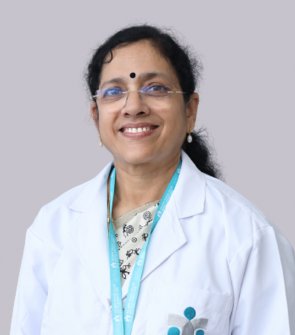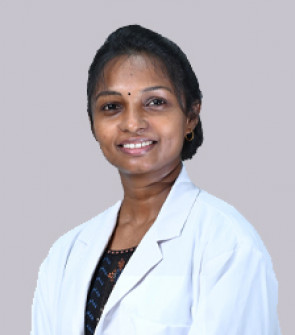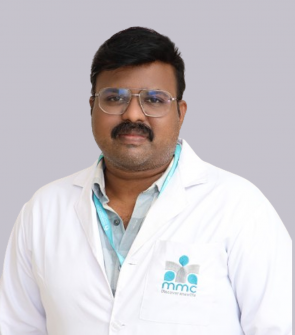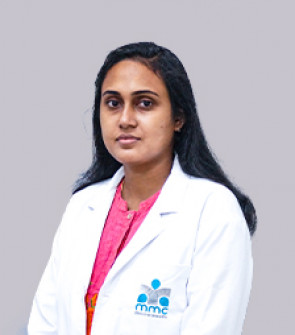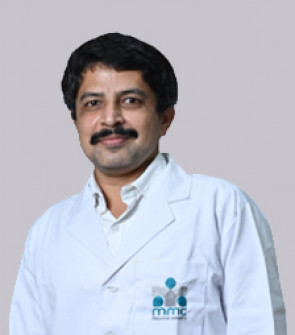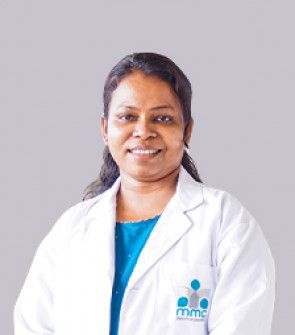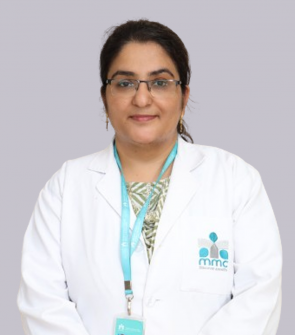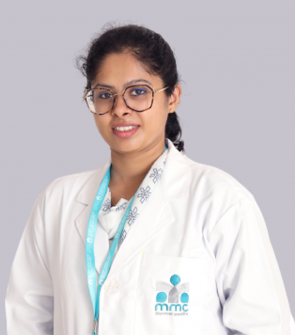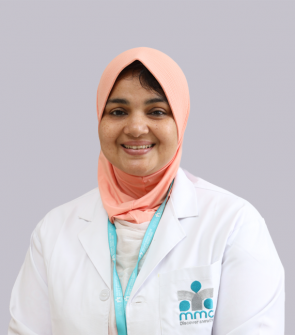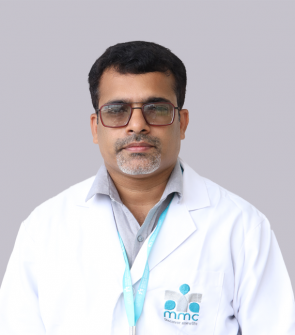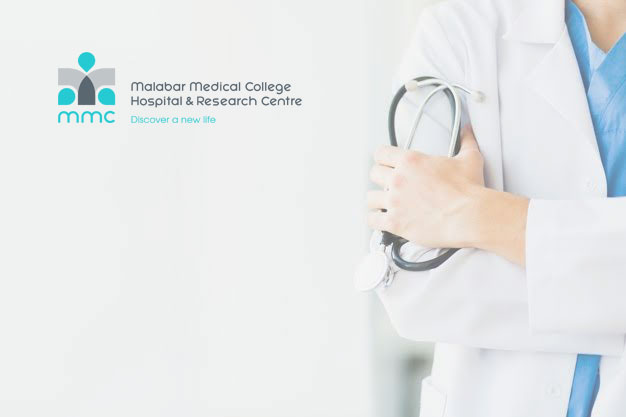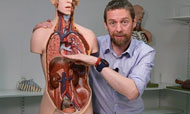
Anatomy
Faculties

Overview
- Malabar Medical College, Department of Anatomy was established in 2009
- Primarily a teaching department and responsible for teaching anatomy and guiding 250 Medical, 100 Dental and many BSc Nursing and Paramedical students.
- The department try to inculcate a love for the subject by using different modalities of teaching and interactive sessions and make their tenure in the department informative, enjoyable and a memorable one
- Anatomy taught in three ways : Gross anatomy by cadaver dissection, Microanatomy by projection of histology slides and Embryology & Medical Genetics using charts,
models and specimens of fetuses.
Teaching Program
Academics
- To provide the basic knowledge of Anatomy for building a strong foundation for a clinical career.
- To imbibe professionalism into the budding doctors.
- To instill a research oriented approach at the undergraduate level
- To improve continually the efficiency of learning for our students
- To strive for excellence in the Anatomy Teaching Programmes
Facilities
- Dissection Lab – Department consists of an excellent, spacious and well ventilated dissection hall with an attached cadaver storage and specimen handling room. Seperate locker rooms are provided for girls and boys to keep their belongings. LCD projector with big screen is being provided in the dissection hall for giving a preview on dissection.
- Dissection Hall 2 with 100 seating facility.
- A well equipped Histology lab with around 90 microscopes and good quality sections of all tissues. Two preparation rooms with all the equipments required for preparation of slides and its staining.
- A well spacious Lecture hall with LCD projector.
- 2 Demo rooms with LCD projectors.
- Museum with about 250 specimens including soft tissues, bones & models.
- Department library with good collection of reference books.
- Neuro Anatomy Research Lab.
- Department Library with good collection of reference books and Journals (National & Inter National).
Research
RESEARCH PUBLICATIONS BY FACULTIES OF THE DEPARTMENT
Dr. Ashalatha P R, Professor& HOD
- Ashalatha PR, Padmini Hanna Noone. Variations in the number and morphology of cusps of aortic valve. Anatomical and surgical relevance. Journal of Evolution of Medical and Dental Sciences, Jan.30, 2017, Volume 6, Issue 9; 694-698.
- Ashalatha PR, Jayasree K. Anomalies of gall bladder and cystic duct. Indian Journal of Applied Research. February 2017, Volume 7, Issue 2: 25-28.
- Ashalatha PR, Jayasree K. Accessory Hepatic Ducts and their Surgical Relevance. Journal of Evolution of Medical and Dental Sciences. February 13, 2017. Volume 6, Issue 13: 1044-1046.
- Ashalatha PR, Padmini Hannah Noone. Variations of the Pulmonary Valve. International Journal of Biomedical Research, February 2017, Volume 8, Issue 2, p.58-63.
- Ashalatha PR, Narayanan Govindaraj, Mrs.Manju, Mr.Abeed Malik. Phenotype-Karyotype Correlation of patients with primary amenorrhoea in North Kerala. Indian Journal of Applied Research, March 2017, Volume 7, Issue 3, P.1-6.
- Jayasree K, Ashalatha PR, SmithaS.Nair, Jenish Joy. Variations of muscle plantaris. Anatomical and Clinical Implications. Journal of Evolution of Medicine and Dental Sciences.June 6, 2016, Volume 5, Issue 45: 2792-2796.
- Jayasree K, Ashalatha PR. Anomalous Origin of Coronary Arteries: Anatomical Study and Clinical Correlates. Journal of Evolution of Medical and Dental Sciences, August 11, 2016 Volume 5, Issue 64: 4588-4592.
- Deepa S, Ashalatha PR. A study of origin, course and variations of superior Mesentric Artery and Its Branches. Journal of Evolution of Medical and Dental Sciences, Dec. 29, 2016, Volume 5, Issue 104: 7660-7663.
- Jayasree K, Ashalatha PR. A study of coronary artery dominance – Anatomical Approach with Clinical Insight. Indian Journal of Applied Research, February 2017, Volume 7, Issue 2: p.119-121.
- Deepa S, Ashalatha PR. A study of origin, course and variations of inferior mesenteric artery and its branches. Indian Journal of Applied Research, June 2017, Volume 7, Issue 6, P.1-3.
- Faiza PK, Ashalatha PR. Variations in the origin of Medial Circumflex Femoral Artery, IJAR 2019 Jan, Vol.9 (1) p.36-38.
- Ashalatha PR, Anilakumari VP. Can occupational exposure to formaldehyde cause Thyroid dysfunction? – A cross sectional comparative study. International Journal of Current Advanced Research. January 2019, Vol.8 Issue 01(F) p.17124-17127.
- Ashalatha PR, Manju M. Chromosomal abnormalities detected in infertile males. A Retrospective Study.Indian Journal of Applied Research. Aug. 2019, Vol.9 Issue 8, p.28-31.
- Ashalatha PR, Manju M Chromosomal anomalies in children in a tertiary care centre – A Restrospective Study. International Journal of Scientific Research.June 2020, Vol.9, Issue 6, p.1-4.
- Ashalatha PR Ranjini. PB. Anterior Interosseous Nerve : Variations in distribution and possible structures causing entrapment, IOSR, June 2020, Vol.19, Issue 6, P.31-35.
- Pineal cyst: A gross and radiological study, Dr. Soumya Mannarackal, Dr. Ashalatha P R, Dr. Noufal Perumbalath, IJAR, vol 13, Issue July,2023.
- "Superficial Palmar Arch - Incomplete Variants " Hema Haris, Ashalatha P R.
- Incidence of vertebral ganglion in cervical sympathetic trunk- Nimmy Manuel, Lekha K. S., Geslin Varghese, Ashalatha P. R., Dr. Arun Das- DOI:10.69605/ijlbpr_14.3.2025.194.
- Recurrent pregnancy Loss-Chromosomal anomalies in couples- Ashalatha PR, Priyna N, Manju, Shyja. International Journal of Biomedical Research, ISSN 0976-9633, Feb, 2021.
- Prevalence of Abnormal Karyotypes among Males with Non-Obstructive Azoospermia and Severe Oligozoospermia: A Retrospective Study. Priya Narayanan, PR Ashalatha, Vol – 15 (2), Journal of Clinical and Digastric Research, Feb,2021.
- A Cadaveric Dissection Study of Accessory Phrenic Nerve, Indian Journal of Applied Research, Volume- 12, Issue 3 March, 2022.
- Ashalatha PR. Situs Inversus Totalis – A Case Report. Calicut Medical Journal. 2014, Vol.12 No.4.
- Smitha S Nair, Jayasree K, Ashalatha PR, Jenish Joy. Unilateral Rectus Sternalis Muscle – A Case Report. National Journal of Clinical Anatomy, July 2016, Vol.5, Issue 3, page: 172-175.
- Jayakumar G R Ashalatha PR Splenic Pseudocyst – A Case Report, IJAR Vol 10, Issue 8, Aug.2020. P40
- Diaphragmatic Fissure of Liver – A Case Report- Dr. Rafeeq P, Dr. Ashalatha P R - Vol 14, Issue March, 2024.
- Text book of Applied Anatomy & Physiology for Nurses- 8th Edition, Jay Pee Publishers.
- Text book of Applied Anatomy for BSc Nursing Students- 4th Edition, Jay Pee Publishers.
- Essentials of ANATOMY & PHYSIOLOGY for Allied Health Sciences, 1st Edition, Jay Pee Publishers.
- Text Book of Applied Anatomy & Physiology for GNM Students, 2nd Edition, Jay Pee Publishers.
Dr. Meera. K, Professor
- Kugananthan.M*, Sadeesh.T, D’Silva. H, Anbalayan.J, Sudha Rao- Histological study on the Obliteration process of Ductus Arteriosus in still born fetuses. Jr Dental and Medical Sciences.2014:13(7);28-31.
- Rao.S, Kugananthan.M *, K.Sujatha. H.R. Krishna Rao- A study on branching pattern of arch of aorta with its embryological significance and review of literature. Int.Jr.of Anatomy and Research.2017,5(1):3516-20.
- N.Shakunthala, Kugananthan.M *, K.Sujatha, H.R.Krishna Rao- A radiological anatomical study on Cadaveric Kidneys to trace the course of polar arteries to Kidneys. Int.Jr.Anat Res 2016, 4(4): 3156-60
- Kugananthan.M *, Anbalayan.J, Sudha Rao, Hydrina D’Silva, Sadeesh.T- Congenital diaphragmatic hernia. A case report. JMed Sci.2014:(3(2), 80 - 83
- VedhaShanmugaSundaram, Kugananthan.M *, Sadeesh.T, Rijied Thompson Swer, Aruchandra Singh- A rare variant of bilateral brachial plexus. A case report. Jr.of Int Academic Res for multi-disciplinary-2014 :2(7);546-50.
- Prabhavathy.G, Sadeesh.T, Kugananthan.M *, Chandra Philip X, Anbalayan.J. Histomorphological study of Hyrtt’s anastomosis in pregnancy induced hypertension and small for gestational age- A clinical correlation. Biomedicine-2020;40(2) : 123-127
- The study of morphology of placenta in anaemic subjects in south Indians Kavya.N, K, Kugananthan, M, & Ramakrishnan, S. International Journal of Health Sciences ISSN 2550-6978 E-ISSN 2550-696X © 2022. 27 July 2022
- 8. Histo-pathological findings in kidneys with polar artery: a demystifying endeavor. N. Shakuntala Nallagatla, Kavya Nannam, Meera Kugananthan, H. R. Krishna Rao, B. N. Kumarguru. International Journal of Research in Medical Sciences Nallagatla NS et al. Int J Res Med Sci. 2022 Dec;10(12):2826-2830.
- Morphometric analysis of inguinal region – A Cadaveric study. Meera kugananthan, Sadeesh T, Arthi G, Prabhavathy G, - Journal of Cardio vascular disease Research. 2022; 5(13) ISSN 0975- 3583, 0976-2833.
Dr. Stelin Wersely, Associate Professor
- Comparative analysis of baseline and cranial measurements in idiopathic mentally retarded and normal children in South Tamil Nadu, Stelin Wersley AM, Kumar KV, Perumal A, Nandita S, Brindha TR - ISSN:0975 -3583,0976-2833 VOL12, ISSUE 05, 2021
- AMELIORATION OF INFLAMMATION BY SMILAX OVALIFOLIA ROXB.
- Divya V.V, Kumar KV, Perumal A, Stelin Wersly A.M Eur. Chem. Bull. 2023, 12 (Special Issue 4), 4752-4763
Dr. Nimmy Manuel, Associate Professor
- Surgical anatomy of cervical sympathetic trunk: a cadaveric study - Nimmy Manuel, Lekha K. S., Lola Das2, Seena N. International Journal of Research in Medical Sciences | February 2022 | Vol 10 | Issue 2
- Incidence of vertebral ganglion in cervical sympathetic trunk - Nimmy Manuel, Lekha K. S., Geslin Varghese, Ashalatha P. R., Dr. Arun Das5 - International Journal of Life Sciences, Biotechnology and Pharma Research Vol. 14, No. 3, March 2025
Dr. Gopalakrishna. K, Assistant Professor
- Gopalakrishna K*,KashinathaShenoy M, Preetha., ‘Meningo-Orbital Foramen-In South Indian Dry Skulls and Its Incidence’. RJPBCS, Vol-5(1) Jan-Feb 2014, Page 729-734.
- Gopalakrishna.K1*, B.S.Rathna2 , The study on the incidence and direction of nutrient foramina in the diaphysis of femur bone of south Indian origin and their clinical importance. IJBLS- International journal of basic and life sciences. 2014, Vol- 2 Issue-2, April,11-19.
- KashinathaShenoy*, Gopalakrishna.K., A clinical profile of fungal corneal ulcer in tertiary eye care hospital in coastal Kerala. International journal of medical and applied sciences. 2015, Volume 4, Issue 1, page 25-29.
- DeepalaxmiSalmani*1, Suja Purushothaman2,*, Gopalakrishna3, Laveesh Ravindran4, Santhi ReghuNath5, BisharPushkar6., A study of Dermatoglyphics in relation with blood groups among first year MBBS students in Malabar Medical College., Indian Journal of Clinical Anatomy and Physiology, July-September 2016;3(3);348-350. DOI: 10.5958/2394- 2126.2016.00079.7
- Gopalakrishna. K *1, Deepalaxmi S 2, Somashekara S.C 3, Rathna B.S 4. An anatomical study on the position of Mandibular Foramen in 100 dry mandibles. International Journal of Anatomy and Research, Int J Anat Res 2016, Vol 4(1): 1967-71. ISSN 2321-4287. DOI: http://dx.doi.org/10.16965 / ijar.2016.122.
- Gopalakrishna K*, Deepalaxmi S, Somashekara SC, Rathna BS. A cadaveric study on morphological variations of fissures and lobes in the human lungs and its clinical significance. Journal of Experimental and Clinical Anatomy ‐. Volume 16, Issue 1, January-June 2017; 16:7-11.
Dr. Ravdeep Kaur, Assistant Professor
- Localization of mandibular foramen – a comparison between dry bones and orthopantomogram - Ravdeep Kaur, Rajan Kumar Singla , Ravikant Sharma , Sanju Singla © 2022 JOURNAL of MEDICINE and LIFE. VOL: 15 ISSUE: 5 MAY 2022
- Comparative Evaluation of Morphometry of Mental Foramen using Orthopantomogram and Dry Bones in North Indian Population - Ravdeep Kaur1, Rajan KumarSingla2, RaviKant Sharma3, Sanju Singla4. Journal of Clinical and Diagnostic Research. 2022 Jun, Vol-16(6): AC06-AC10
Dr. Hema S, Assistant Professor
- Superficial Palmar Arch - Incomplete Variants " Research paper in the Indian Journal of Applied Research, an international journal in September2024
Dr. Rafeeq P, Assistant Professor
- Diaphragmatic Fissure of Liver – A Case Report- Dr. Rafeeq P, Dr. Ashalatha P R. Vol 14, Issue March, 2024
Dr. Geslin Varghese, Assistant Professor
- Incidence of vertebral ganglion in cervical sympathetic trunk - Nimmy Manuel, Lekha K. S., Geslin Varghese, Ashalatha P. R., Dr. Arun Das - International Journal of Life Sciences, Biotechnology and Pharma Research Vol.14, No. 3, March 2025
- Morphological and Morphometric Study of Papillary Muscles in Adult Cadaveric Hearts: A Cross-sectional Study from Central India. Geslin Varghese, Mayura Setiya - Journal of Clinical and Diagnostic Research. 2025 Jul, Vol-19(7): AC01-AC04
Mrs. Aswathi Ramesh I, Tutor
- An Experimental Study on the Effect of Maternal Folate Diet on Microstructure of some vital organs of offspring - Lokadolalu Chandracharya Prasanna, N. Vinaykumar, Aswathi Ramesh - Anatomical society of India, Vol 69, Issue No: 1, Jan, 2020
Activities
Involved in teaching of MBBS, BDS, BScNursing, Bsc Optometry, BSc MLT,BPT,DRTcourses
Teaching Learning Methods have been updated in accordance with the new Competency Based Medical Education.
Seminar presentations for students are done regularly after which an interactive session is conducted between faculties & students for clarifying the doubts & understanding concepts
Small group discussions are being conducted frequently from dissection hall and active participation of each & every student is ensured
Clinical Oriented questions are given related to each topic and doubts regarding it are clarified
Vertical integration for clinically relevant topics are conducted monthly where clinicians from various specialities give interesting talks on the subject including the videos of various clinical cases & procedures .Students were also taken to wards to observe the Bedside clinical evaluation by clinicians and understand the rapport between doctor & patient.
Periodic feedback are collected from table representatives from each dissection table where they can address the difficulties faced by them and appropriate rectifying measures are taken accordingly.
SLOs & relevant diagrams for each topic is given.
After each internal exams students are categorized according marks.Intensive training , great attention& care are given for weak performers
Table wise mentoring is done regularly by table teachers where mentees are being monitored continuously.Students are free to communicate academic, personal, financial, social or any problems with the mentors which will be held highly confidential and solutions are sorted out .Feedback of each mentee is given to parents periodically. Parents are also free to contact mentors if they have any queries.
Model making contest for embryology topics was conducted to make the students study the topics in a more interesting& simplified way Students were divided in to groups and each group was asked to select a particular topic.They were given 1 hour time to make the model. Representatives from each group was asked to present the topic.All the groups came out with wonderful models which helped them a lot in stretching their imaginations and clarifying the doubts.
X-Hebacon 23-CME on 12th August, 2023.
Anatomy Kaicon- Anatomy State conference on May 4th, 2024 of ASI Kerala Chapter.
Mednova II- Medical Conference on 26th April, 2025.
Manniquins- Made for the purpose of training in surface marking for UG & PG.
Add On Course as directed by NMC.





